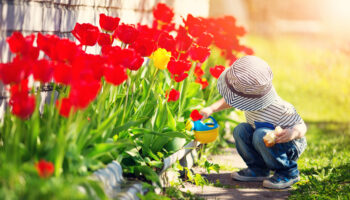Kelli Harris
I think “playing in the dirt” has become a dying activity. I spent my summers as a child outside digging with shovels and rakes and sticks, manipulating the dirt and playing with bugs I often unearthed. When I was a center director, children would love playing in the dirt, but often I got complaints from parents that their children were getting too dirty. Wasn’t that the point?
I am an avid vegetable gardener. To this day, I l still love to dig in the dirt. For me, it helps relieve stress. What benefits can it have for children?
Many children love sensory play, feeling things slip and slide through their fingers. Gardening provides this type of play. Preschool children tend to be fascinated with digging in the dirt and finding bugs. This age group of children can help dig holes with small trowels, plant seeds, and water plants with a small watering can or hose. These tasks help develop their fine motor skills. Older children can read the seed packets and follow multi-step directions for planting. All children can benefit from other skills- language, critical thinking, problem solving, and cooperation skills gardening can develop. Children can make predictions about how long or how tall something will grow or whether the vegetables will grow above or below ground. It can become a math lesson if they measure how far apart to plant the seeds or measure how much the plants grow each week. Teachers can ask open-ended questions, such as “Why isn’t this plant growing?” or “What else do you think the plant needs to grow?”, identify words such as “harvesting”, “cultivating”, “vegetation”, and “horticulture”, and help children learn to share the gardening supplies. Research shows that children are likely to be more active the longer they are outside. It can also lessen the chance of developing allergies and give their immune system a boost.
Maybe most importantly, allowing the children to be involved in every step of the gardening process may get them excited to taste (and subsequently eat) more vegetables. Not only is gardening a great science lesson about what plants need to grow, but it helps teach them about food itself and where it comes from. Do you know that research shows that children who help garden are more adventurous when trying new vegetables because they had help in growing them? This is important because according to the Centers for Disease Control and Prevention (CDC), nine out of 10 children still don’t eat enough vegetables. You can start small and grow vegetables that you think most children will like-cherry tomatoes or bell peppers and move onto something more adventurous, such as cucumbers or sugar snap peas. Children can be part of the process from start to finish- from planting the seeds to cleaning the veggies after they’ve grown, to setting the table to eat those vegetables for snack, and hopefully thinking of their homegrown vegetables as a tasty treat!
9 Benefits Of Letting Your Kids Play In The Dirt (thealternativedaily.com)
Progress on Children Eating More Fruit, Not Vegetables | VitalSigns | CDC
www.sciencedaily.com/releases/2007/04/070418163652.htm




